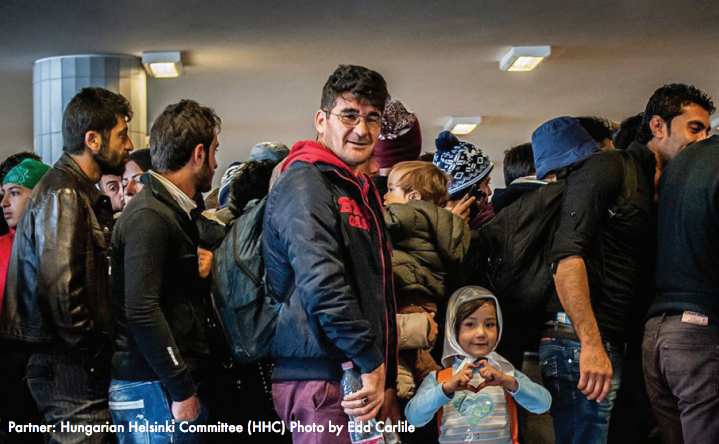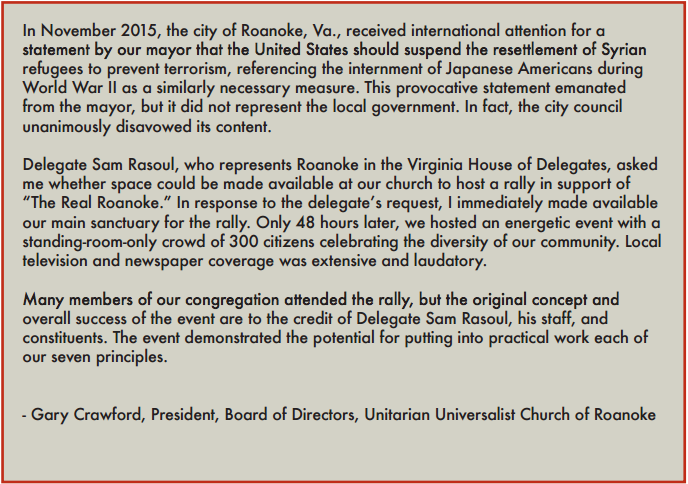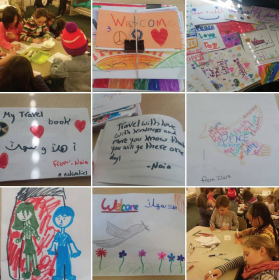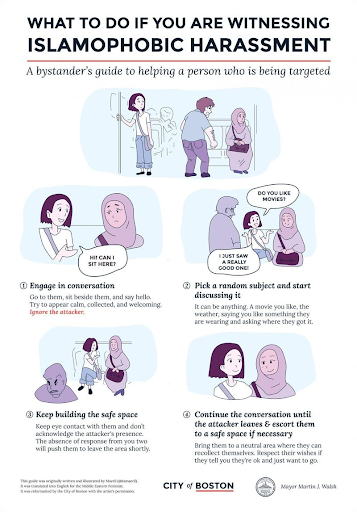The Unitarian Universalist Service Committee advances human rights through grassroots collaborations.
← Humanitarian Crises Resources
Countering Islamophobia

In recent years we have seen clear evidence that hateful rhetoric can lead to violent actions. A prime example of this is the Trump administration’s anti-Muslim rhetoric, which since his election has fueled hate crimes against Muslims to levels even worse than after September 11, 2001. With the escalation of violence that has been triggered by the January 2 assassination of Iranian military leader Qassim Suleimani, we expect to also see a rise in anti-Muslim statements and actions within the US.
Please use the resources on this page to learn more about how anti-Muslim and anti-immigrant bigotry fit into a larger dynamic of institutional racism toward people of color in the United States, and take action to challenge these forms of discrimination and hostility.
Harmful depictions of Islam are not new, and they fit into a larger pattern of political scapegoating and criminalization that target other communities of color, including Black, Latinx, and Native communities. Islamophobia targets both new refugees and Muslims whose families have been in the United States for generations.
Learn more about state-sponsored islamophobia and the “grassroots islamophobia movement” as part of the Love Resists study guide, which can be used as a self-study resource or shared as part of a workshop or meeting. This resource, with materials from UUSC’s partners Muslim Justice League and Muslim Anti-Racist Collaborative, explains the harm of government surveillance programs that target Muslims such as “Countering Violent Extremism” (CVE), Joint Terrorism Task Forces, and Homeland Security Fusion Centers (which share information, much of it speculative, between local, state, and national law enforcement).

Since the 2016 electoral season, anti-Muslim and anti-immigrant bigotry have been alarmingly consistent. Countering hateful messages is an important part of creating the world we believe in – a world in which the human rights and dignity of all people are respected. The way in which we speak our alternative message is as important as the content of that message. If we confront someone who is shouting about keeping out immigrants by shouting back at them, our message is likely to be lost in the method of delivery. When we hear racially charged statements from public figures, we often feel offended, angry or humiliated. It’s important to be aware of these feelings so we can choose our message and tone of communication with care. Monitoring our reactions can also help us maintain a stance of nonviolence, calmness, and dignity when directly confronting an angry or offensive adversary.
Here are some steps that can help:
- Before writing a response to an article or news item, think about the values you most want to elevate to counter a message of hate. Rather than belittling your adversary’s values, lean into the ones you most want to emphasize: justice, compassion, peace-building, diversity, dignity, and hospitality.
- If you have an opportunity to attend a protest or a counter-rally in the name of immigrant rights or racial justice, try to gather a group of friends or members of your organization or congregation and go together. Invite the group to spend some time preparing for how best to respond to potential violent words or actions in ways that will not escalate the anger but will elevate a powerful counter-statement.
- In the context of heated confrontations at rallies or protests, remember the power of song, silent witness, and prayer. Some of the most eloquent denunciations of hate speech have come in such forms.
Four ways to take action
Here are four ways for the rest of us to support Muslim and other immigrant neighbors and educate ourselves about their faith and culture.
If you are part of a congregation or campus faith group, ask your clergy person to contact the local mosque to identify yourselves as allies for the Muslim community. Even if the relationship goes no further immediately, it will be helpful for them to know they can turn to your congregation for support if a hate crime occurs.
Whether your clergy person gets involved or not, you can always reach out and explain that you are interested in being an active ally. Ask if they are looking for support from the greater community. Find out if they have programs for the public, like an introduction to Islam class, or if they would be interested in collaborating with your congregation to hold interfaith dialogues.
One option is to use all or part of the seven-session curriculum, “My Neighbor Is Muslim,” by Lutheran Immigrant and Refugee Services (LIRS). Another option is hosting a book group featuring Sacred Ground by Eboo Patel, a renowned young Muslim community leader, which is a fantastic primer on fostering interfaith collaborations, published by Beacon Press.

Children of all ages are absorbing the messages around them, both explicit and implicit. Don’t wait until you are faced with a difficult situation – start the conversation now. Ask them what they know about different faiths and cultures, and share your family’s beliefs about inclusion and hospitality. Encourage them to speak out if they see discrimination or bullying occurring at school. Have age-appropriate books and movies that show positive representation of Muslims and Islam, and consider monitoring what media they watch and have discussions about it.
There are excellent resources for children and youth that can be of use to both parents and UU religious education programs. One of our favorites is the Southern Poverty Law Center’s Teaching Tolerance lesson on Islamophobia.
Be prepared, and help others prepare, to intervene with public instances of islamophobia in a way that is most likely to de-escalate the situation and help the person targeted to not feel alone.
Our friends and colleagues at the American Friends Service Committee have compiled some excellent resources on bystander intervention. You can also watch their 2017 Bystander Intervention webinar training which includes practice scenarios.
If you are interested in hosting your own training with your congregation or community group, there is an excellent Bystander Intervention 101 Training Guide put out by the People’s Response Team.
